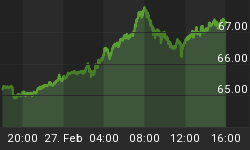It seems to me that as time goes by, Alan Greenspan is backing himself into a corner he is rapidly running out of options. He famously quoted that he relished the chance to be able to fight a Kondratiev winter, personally I felt this was somewhat of a rash statement as fighting the tides of history, is always going to be fraught with danger and eventually failure.
What has he achieved these last few years? Since 1995 he created the largest stock market bubble the world has ever seen. He stated that it is very difficult to identify a "bubble" (Federal Reserve Trademark) until after the event. I would suggest that when basic valuation metrics such as the PE ratio climbs to stratospheric historic heights, when the chart of the major indices becomes obviously parabolic, and when major index gains were in the region of 30% to 40% annually, a detective would have deduced that we were probably in an unsustainable "bubble" (Federal Reserve Trademark).
The inevitable bust has now created a new Alan Greenspan "bubble" (Federal Reserve Trademark) in the housing market which has all the hallmarks of the stock market "bubble" (Federal Reserve Trademark). FACT: prices are running way ahead of incomes and rental values and the direct material replacement cost of building a house. FACT: The graph is looking parabolic. Mr Greenspan if you are finding it difficult to yet again identify this "Bubble" (Federal Reserve Trademark) I will try and help you IT IS A BUBBLE ALAN!
The "conundrum" that Alan Greenspan now faces is a simple one. America is rapidly going bankrupt owing to basic financial incompetence and needs constant infusions of money at the rate of some $2.9 billion dollars a day to keep the illusion of a prosperous economy going for a little while longer. However, the money providers are getting somewhat unhappy and nervous. Because the huge amounts of dollar denominated debt that they hold becomes ever more worthless as the dollar sinks. They have even been complaining publicly about this fact recently, can you imagine what they must be saying privately! First the Chinese, then the South Koreans, finally the Japanese. Is this just a coincidence?
America has no choice but to take these economic threats very seriously. Somebody has to keep buying all the new debt and they must continue to hold their old debt at all costs. So now we are seeing some interest rate rises to halt the dollar decline. To me the Dollar chart does not look so bearish anymore. I am not saying for one minute that we are going to see a glorious new dollar bull, what I am saying is that we will probably see a sideways trading market bordered for the foreseeable future between 80 and 90 on the USDX. The only way Alan Greenspan can strengthen the dollar is to get international capital flows moving back into the dollar, and the only way he can do that is to make it more attractive to hold dollars by raising interest rates. At present you are faced with a negative return for holding dollars.
The real problem is that by raising interest rates to stabilise the dollar which must be done to satisfy Americas numerous creditors is a very risky proposition. America is awash with $40 trillion dollars of debt; the whole economy is a giant debt leveraged hedge fund. Small increases in interest rates are magnified greatly on such a large sum, especially when we are starting the interest rate rising cycle from such a low level. For example a 1% rise in rates from a starting point of 10%, is a rise in real terms of 10%. The same rise of 1% from a starting point of 2% is a 50% rise in real terms. As interest rates inevitably rise the leveraged stock markets, Bond markets and housing markets will fall.
This is Alan Greenspan's very high wire balancing act and his real "conundrum". He must raise interest rates to keep Americas creditors happy but he must also simultaneously try and keep the Stock markets, Bond markets and Housing markets afloat. It is rapidly becoming the moment of truth for a highly leveraged America.
Higher oil prices are exacerbating his problem as high oil prices have a 100% track record of causing recessions, and in a recession the stock market falls by an average of 43%. However It can be argued that yet again Alan Greenspan has partly caused the high oil prices by devaluing the dollar, the very currency that international oil prices are denominated in. Also the Federal Reserve together with Wall Street have partly created the commodity bear market this last 20 years, which is now coming back to haunt them, in a drive for the acceptance of there debt based paper and financial assets.
We know that the number 7 has a major significance as it happens to be the long-term rate of return of nearly all markets. Would it not be a good idea to fix an interest rate very close to this level which is left alone so that borrowers can plan for the future, and savers are fairly rewarded? Alan Greenspan tries to "time" the markets with his interest rate moves but his record like most market timers is frankly dismal. By fixing an interest rate you also largely avoid very damaging and wasteful "bubbles" (Federal Reserve Trademark) which has become a Federal Reserve speciality under Alan Greenspan's tenure, it really is his trademark and enduring legacy. Of course my suggestions will never come to be, primarily because financial asset inflation fuelled by endless debt production is now the American economy!! It is all very sad really.















